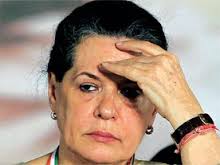
As the SP and BSP--both outside supporters of UPA government and JD(U)--slammed Dwivedi's remark as "anti-social justice", Gandhi went in a damage control code with Lok Sabha elections just round the corner, snubbing Dwivedi and asserting there should be "no doubt or ambiguity" over the party's stand on caste-based quota.
BJP and SAD questioned the timing of the remark and said it was part of Congress' votebank politics with an eye on the upcoming elections. The remark triggered an uproar both inside and outside parliament. The discomiture in the party over Dwivedi's remarks was palpable and Congress and the government earlier in the day were quick to distance themselves from the remark, saying it was his "personal" view.
"The empowerment of SCs, STs and OBCs has been an article of faith with the Congress."There should be no doubt or ambiguity on the stand of the Congress on the system of reservation for SC/ST and OBCs. They were introduced by Congress, they have been strengthened by the Congress and they will continue to be championed by the Congress," Gandhi said in a two-page statement.
Gandhi said that Congress is of the "firm opinion" that the system of reservations for SCs, STs and OBCs must continue. "This is essential to deal with the discrimination imposed by centuries of subjugation and oppression," she said.
SP leader Ram Gopal Yadav and BSP chief Mayawati slammed Dwivedi for his remark.Yadav said Congress is trying to end the social justice system in the country while BSP chief Mayawati demanded that the Congress must make its stand clear on the issue.
Dwivedi's suggestion created an uproar in Parliament with BSP members shouting slogans like "anti-poor government, down down" in the well of Rajya Sabha. They were also joined by SP members while those from JD(U) said Congress is doing away with the reservation system and cried "conspiracy."
BSP members in Lok Sabha also rushed to the well of the House. Outside Parliament, BJP questioned the timing of the suggestion, saying the "revolutionary idea" should have come long ago.
"We want progress of all sections of society. But why this revolutionary idea came to Congress leader's mind when the elections are round the corner? There was enough time with them earlier and it could have been debated on national platform," BJP leader Mukhtar Abbas Naqvi said.
Without rejecting the idea, he said, "We are always in favour of giving opportunity for progress to whoever is economically or socially backward."
Naqvi's party colleague Ravi Shankar Prasad dubbed Dwivedi's pitch against reservation on caste lines as a "trial balloon" and charged the ruling party with deliberately trying to initiate a new debate to sidetrack "anti-government" sentiment on issues of corruption and price rise. Akali Dal MP Harsimrat Kaur Badal, though supporting the suggestion, also questioned the timing of the move.
"Why this move at this time? Though it is a very good idea but according to me, anything that is moved by Congress now it has only one agenda. They are targeting a particular group for votebank politics. They had 10 years, they could have done a lot, but they did nothing," she said.
While maintaining that Dwivedi is an "extremEly seasoned and experienced" politician, Congress spokesperson Randeep Surjewala said, "His statement on the issue of caste-based reservation or absence thereof is his personal opinion."
Amid uproar in Parliament over the issue, Minister of State for Parliamentary Affairs Rajiv Shukla said in the Rajya Sabha, "The government is not considering any proposal to provide reservation based on economic criteria. The reservation as it stands today will continue as per constitutional provision."
Dwivedi, who is a member of the Upper House, was present when Shukla made the clarification.






Comments
Add new comment